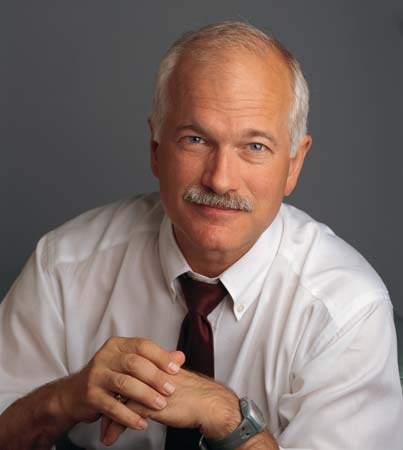Layton, Jack
Canadian politician
in full John Gilbert Layton
born July 18, 1950, Montreal, Que., Can.
 Canadian politician who became leader of the New Democratic Party (NDP) in 2003.
Canadian politician who became leader of the New Democratic Party (NDP) in 2003.Layton grew up in Hudson, Que., as the son and grandson of prominent Canadian politicians. His grandfather, Gilbert Layton, served as a cabinet minister under Quebec's Union Nationale government. His father, Robert Layton, served in the House of Commons and in the cabinet of Progressive Conservative Prime Minister Brian Mulroney (Mulroney, Brian). Jack Layton attended McGill University, where he received a bachelor's degree in political science and economics (1970), and York University, where he received a master's degree (1972) and doctorate (1983) in political science.
Layton entered politics while he was still writing his dissertation, running successfully for city councillor in Toronto in 1982. From 1982 to 2003 he served intermittently on the Toronto City Council while simultaneously holding teaching positions at Ryerson Polytechnic University and later at the University of Toronto and York University. During that period, Layton was unsuccessful in his bids for mayor of Toronto (1991) and for the House of Commons (1993 and 1997); however, he briefly served as deputy mayor of Toronto (1990). While a city councillor, Layton aggressively pursued a left-leaning agenda. In the process, he helped engineer a strategy for combatting AIDS in Toronto—the first program of its kind in Canada—and directed attention to environmental policy, championing recycling and energy-efficiency iniatives. Layton developed a reputation as a provocateur and a thorn in the side of conservative politicians. In one particularly memorable display, he and his wife, Olivia Chow, who served on the city council with him and later became a New Democratic Party MP, attended a council meeting with gags in their mouths to draw attention to their unrecognized opposition to an oil deal. In 2000 he was elected president of the Federation of Canadian Municipalities.
In 2003 Layton won the leadership of the New Democratic Party in a landslide, replacing longtime NDP leader Alexa McDonough, who had stepped down. Eschewing the traditional practice of seeking a seat in the House of Commons directly after his election, Layton spent the next year garnering public support for NDP policies. In 2004 he narrowly defeated long-serving Liberal incumbent Dennis Mills to become MP for the Toronto-Danforth riding in an election in which the NDP won 19 seats in the House of Commons. With Prime Minister Paul Martin (Martin, Paul)'s Liberal government shaken by a scandal, Layton was able to negotiate amendments to the 2005 budget, funneling $4.6 billion to finance social programs. In the federal elections in 2006 that followed the dissolution of the Martin government as a result of a no confidence vote, the NDP shepherded by Layton won 29 seats in the House of Commons.
Layton worked in concert with the new administration of Conservative Prime Minister Stephen Harper (Harper, Stephen) on several projects, notably advising Harper on the drafting of an official apology for the treatment of indigenous peoples in residential schools in the late 19th century. Layton raised the NDP's profile internationally in 2006 when he met with Afghan Pres. Hamid Karzai (Karzai, Hamid) and advocated increased reconstruction efforts in Afghanistan rather than a continued Canadian combat role. Layton also ramped up criticism of the Conservative minority government's assertion that the emissions targets dictated by the Kyoto Protocol were unattainable. He threatened to unseat Harper if the Clean Air Act, meant to replace the goals established in the Kyoto Protocol, was not altered; the act was subsequently rewritten to include more stringent emissions targets but was never voted upon. Layton continued his trenchant disapprobation of the Iraq War in 2008 and introduced a successful, though largely ignored, motion to offer political asylum to U.S. Army deserters. In the 2008 federal elections, the NDP, led by Layton, garnered more than 18 percent of the popular vote and added eight more seats to its parliamentary representation.
Layton wrote Homelessness: The Making and Unmaking of a Crisis (2000) and Speaking Out: Ideas That Work for Canadians (2004). He founded an environmental consulting firm, the Green Catalyst Group, Inc., in 1991.
- Daniel Berrigan
- Daniel Boone
- Daniel Bovet
- Daniel Chester French
- Daniel Chodowiecki
- Daniel Coit Gilman
- Daniel Cowan Jackling
- Daniel C. Tsui
- Daniel Day-Lewis
- Daniel Decatur Emmett
- Daniel Defoe
- Daniel De Leon
- Daniel Drew
- Daniel D. Tompkins
- Daniel Dulany
- Daniele Crespi
- Daniele da Volterra
- Daniel Edgar Sickles
- Daniele Manin
- Daniel Ernst Jablonski
- Daniel F Malan
- Daniel-François-Esprit Auber
- Daniel François Malherbe
- Daniel, Gabriel
- Daniel Gabriel Fahrenheit